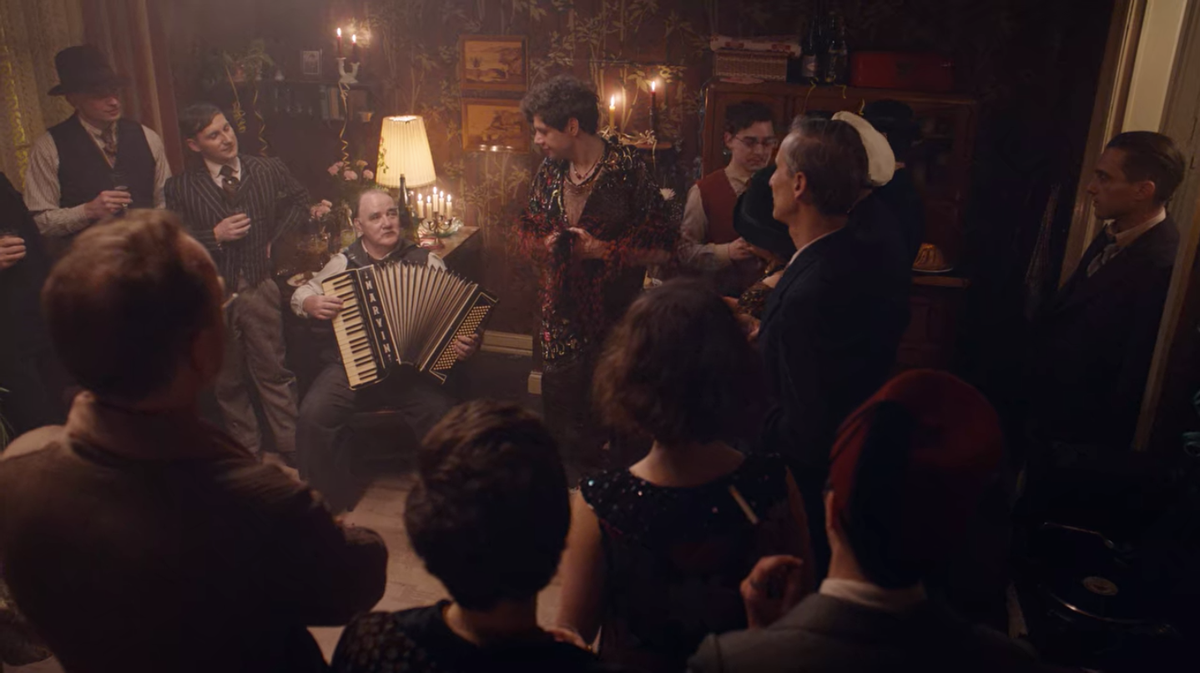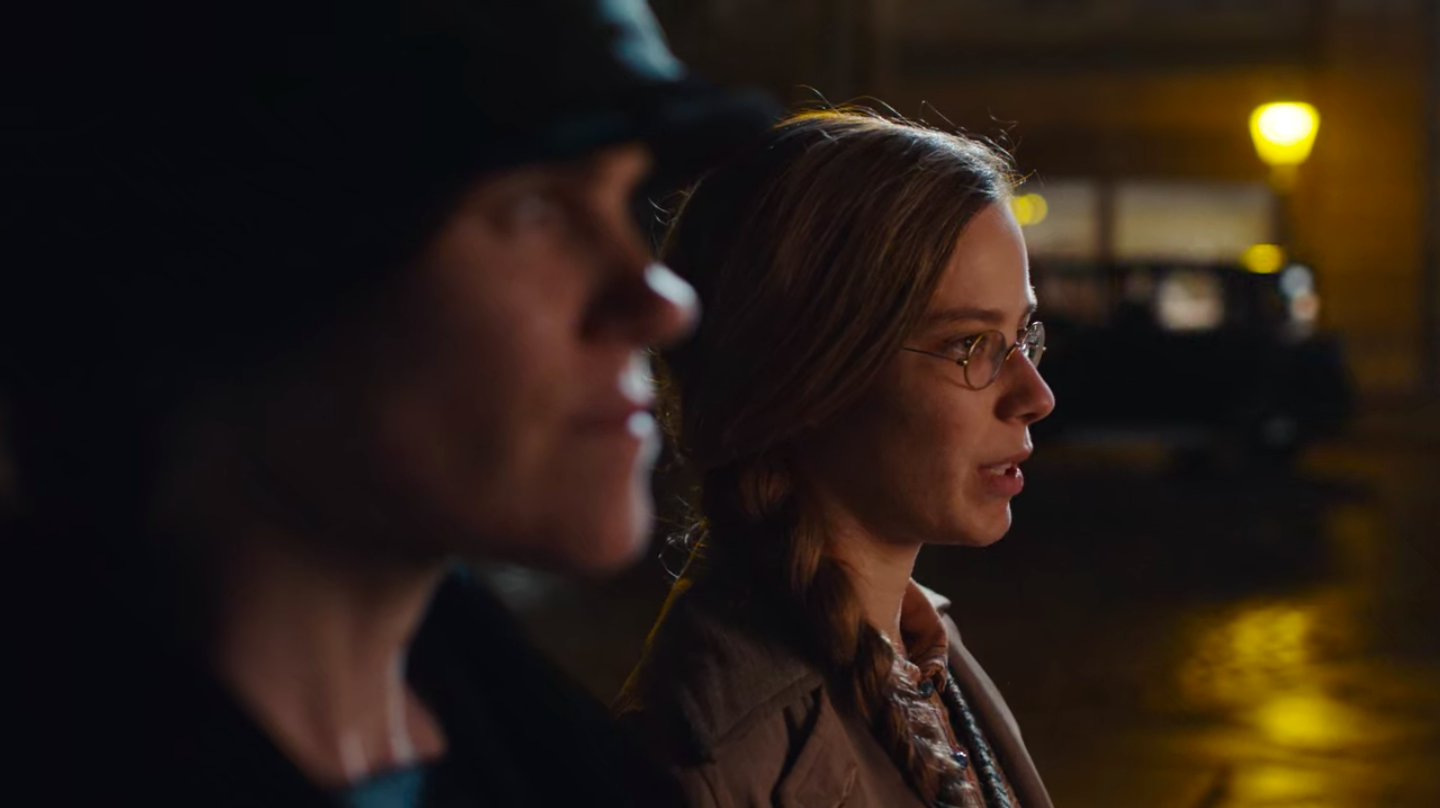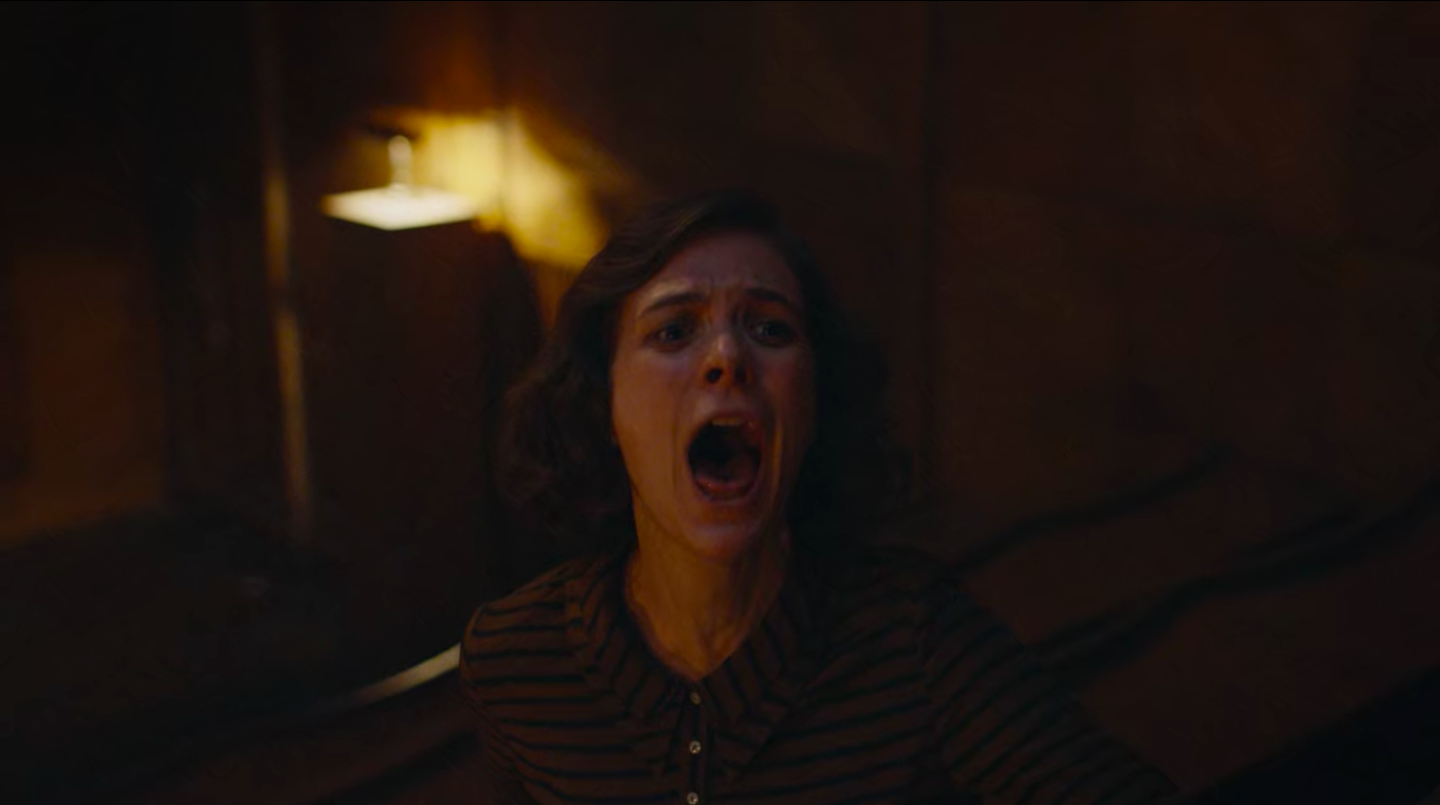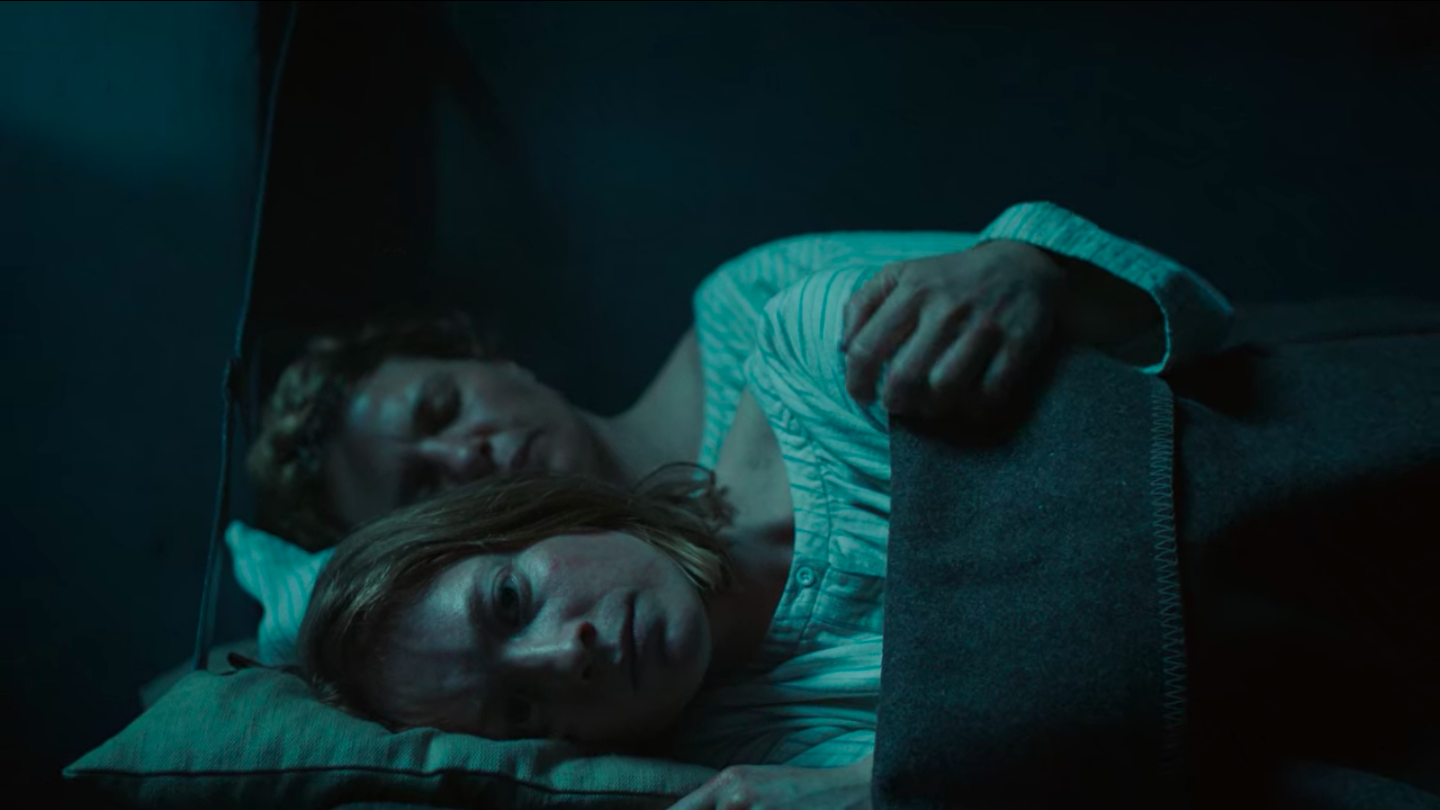Babylon Berlin: "Episode 25" and "Episode 26" (with Meghan O'Keefe)
In which there was much rejoicing

(For the foreseeable future — aka as long as this quarantine lasts — Emily will be watching the critically acclaimed German drama Babylon Berlin, a neo-noir set in 1929 Germany. The series is available on Netflix in the United States. For every installment, she will be joined by a special guest. Today’s guest is the amazing TV critic Meghan O’Keefe. Find her at Decider and on Twitter.)

Emily: OH MY GOD IT FINALLY HAPPENED, JUST AS WAS PROPHESIED. GEREON AND CHARLOTTE KISSED. NO, THEY DIDN’T JUST KISS. THEY FULL ON DEVOURED EACH OTHER. AT A BIRTHDAY PARTY. WHILE GENNAT PLAYED THE ACCORDION. AND GRÄF SANG. THEY KISSED THEY KISSED THEY KISSED THEY KISSED.
Ahem.
If season three of Babylon Berlin has felt slightly like it’s tracking roughly 15 different stories that are scattering in all different directions, “Episode 25” and “Episode 26” do their level best to bring those stories back together, to reveal all of the ways they’re tied together. (I won’t spoil the final two episodes of the season — which I couldn’t stop myself from watching — but they complete this task.) They have a bit of the breathless busy-ness of episodes designed to move pieces around on the board until they’re in the right place for the climax, but they also have GEREON AND CHARLOTTE KISSING OH MY GOD.
Look, I’m not going to be able to talk about anything else until we get this out of the way, so let’s talk about that kiss. It’s so beautifully staged. Really, the whole birthday party scene is. We get those high-angle shots that highlight everybody at the birthday party watching Gräf and Gennat perform, shots that have just enough key light drifting onto Gereon and Charlotte that we can always see them. Occasionally, the camera cuts in to see one or both of them, to check if they are looking at each other. They aren’t always, until they are. And then they slip behind a wall, and—
Babylon Berlin is fantastic at using the geography of a space to convey information about character and plot. We know from seeing the placement of doors that there is a small space behind the wall where two people could come together, hidden from the rest of the party. And so Gereon and Charlotte do, and they kiss, and it’s both an achingly perfect kiss but also beautifully choreographed and set decorated and everything. This is one of the most important moments in the show so far, and the show makes every single second count.
Meghan, what did you think of THE KISS, and please do a play by play if you want. It’s clearly the most important thing to have ever happened in human history. Also: Can we talk about how Helga’s a bummer? She’s such a bummer. (Okay, also, she’s constantly trapped by the circumstances of her era, in a way Charlotte and even Greta aren’t, as evidenced by that back room abortion Charlotte stumbles upon, but wow, her storyline this season hasn’t worked for me.)
Meghan: Emily, I just want to let the record show that the moment I saw THE KISS, I messaged you, “THEY KISSED!!” Within those two words and two exclamation marks, you understood an ocean of emotion. We were both transported back to middle school: just two romantic tween girls excitedly trading notes in class about the prettiest boy and girl in school playing tonsil hockey at long last. The hormones of it all!!!
But in all seriousness, Charlotte and Gereon’s first official kiss — they eagerly touched tongues at the Eyes Wide Shut-adjacent séance, after all — was one of the rare romantic moments I can think of that was completely earned. From the very first episode, where we see the two meet via that exquisitely-framed shot of the elevators entering the audience’s viewpoint at the same time, we’ve known that Charlotte and Gereon have a profound connection. It’s only taken 25 episodes for them to realize it, too. All that waiting only made the payoff all the more sweet.
For me, it’s the most romantic Gereon/Charlotte moment since the season two finale where Gereon carries Charlotte down the road like a groom lifts a bride over a threshold. She notices that the sun and moon are out at the same time. For me, thanks to my own personal biases and the costume choices assigned to Charlotte and Helga, I interpreted that moment as the show explaining that Charlotte is Gereon’s sun and Helga his moon. The trouble was that both could be in the sky at the same time, or to extend the metaphor, in Gereon’s heart.
As for Helga, yikes! I can’t deny that I find her character utterly frustrating. That’s in huge part thanks to the complete lack of character consistency. It’s impossible to know what it is she wants, except... I guess to be loved, but in secret. The girl loves subterfuge, right? Furthermore, while the fantasy dance sequence from season two is one of the show’s most blissfully charming moments, one fantasy montage does not a rich inner life make! The writers of Babylon Berlin are typically so talented at expressing the forces battling beneath the surface of a character’s facade, but with Helga, they are lost.
So, it seems, is Helga. Poor girl makes one of the cardinal mistakes of period dramas: never get a back alley abortion from a woman with dirty hands who can’t pay her rent! It not only always ends poorly, but in this case, Lotte saw you, bitch! (I say “bitch” as a term of endearment and not a mean slur directed at a boring character standing in between Charlotte and Gereon’s love. I mean…)
I also want to say that in addition to the obvious romance of THE KISS, the birthday party sequence also feels like a love letter to an idyllic office setting. Between Gennat acting more avuncular than we’ve seen yet and everyone's eager acceptance of Gräf’s love life, the party felt like Weimar Germany at its best. And as we know… that’s not going to last much longer.
But what say you? And what are we to make of a number of other big moments for a trio of other female characters? I’m talking of course about Greta admitting what’s up to her Communist cellmate, MaLu Seegers flirting with danger, and Elisabeth going full spy for the republic!!!

Emily: My God, do I love Elisabeth’s slow morph into a spy. Here’s a character the show easily could have been done with, a character who mostly existed to be a love interest for Gereon in the early going. Both she and Katelbach could have fallen away from the show easily after season two, but somehow, season three has made them even more central. (Katelbach bustles around Gereon’s apartment now like they’re two warmly disposed husbands entering their second decade of marriage.)
And it’s amazing! Taking this staid and quiet landlady and revealing that she’s actually the best person to carry intelligence back and forth, because few people will suspect her, is an incredibly smart character turn. Yes, it tells us so much more about Elisabeth’s willingness to do things that will help her friend and her country, and it offers a brand new way of seeing her as a character. But it also subtly hints at the ways that the anti-Nazi resistance might keep tabs on each other once Hitler comes to power. It’s not hard to imagine MaLu and Elisabeth continuing to pass information back and forth, assuming they can both make it that far. (MaLu, at least, seems pretty well protected by Wendt’s obvious fascination with her.)
And here’s yet another contrast with Helga: Last season, I found Greta to be the weak link in the show’s storytelling, as she felt hopelessly trapped by a tragedy she didn’t realize she was in the middle of but one where the audience was way, way ahead of her. Now that she’s been ensnared by that tragedy, she’s become a character beautifully bathed in pathos. The scenes in which she and Dr. Völcker have become closer are among my favorites of the season for the ways in which they depict characters getting to know each other through simple, physical gestures. Greta’s words, her confession — those mean something, but so does that hug. These are two people who should not, by any means, be close, and yet they are.
For as much frustration as the Helga plotline gives me — and we haven’t even touched on her whole whatever with Nyssen — I did like Charlotte happening upon her having her abortion. I love the tiny grace notes where the characters cross over into each other’s storylines, and I found this one another interesting conundrum. Charlotte now knows something Gereon doesn’t about the other woman in Gereon’s life. And yet there’s a clear solidarity among women here as well. She hasn’t told him as of the end of “Episode 26.” But will she tell him later?
But goodness, there’s so much going on in both of these episodes! To keep with our theme of the show’s women characters, let’s turn next to Toni Ritter, who is stuck in a horrific situation that, nonetheless, allows her to buy those birds she was eyeing a few weeks ago. The whole reason Charlotte stumbles into Helga’s abortion is because she’s looking for Toni, and it’s fascinating to see the way that Toni seems to see sex work as a chance at self determination, in the same way her sister did. (If she wasn’t aware that what this old man wanted with her was to perv out on her, she surely must have known after he asked her to take a bath.)
There’s a motif in this season of characters being forced to do brutal, dehumanizing things while men in positions of power just… watch them. It’s most obvious with the Ritter sisters — Toni’s bath, Charlotte’s sex show — but there are examples of this throughout the season. Arguably Gereon’s whole deal with Anno even qualifies, because this is a man with power over Gereon simply watching as the detective stumbles around Berlin, slowly losing everything that he cared about.
I love this motif, because it’s central to many of the show’s ideas about the rise of fascism and how difficult it can be to stop. The more that characters debase themselves, the more that those in power are sitting there and watching, vaguely entertained but not, like, super entertained. The lower classes exist only for the enjoyment of these rich, older men, and though these rich, older men might not support the Nazis when they sweep into power, it’s not like they’re going to suffer, most likely. They are literal shadowy figures, pulling on puppet strings.
That’s kind of depressing, huh? Well, let’s talk about just how crazy bananapants wild these episodes are, because the visit from the medium! The reveal of that weird Ichabod Crane cop’s automaton fingerprint framing device! Nyssen being forced to hang out with his mom! The death of Otto, just as Gereon is about to catch up with him! Meghan, please pick up on literally any of these threads, or any of the ones I didn’t mention.

Meghan: Oh my goodness, Emily! The beauty of Babylon Berlin is that the show is capable of juggling all these plot points and then some. Let us not overlook the central plot of the season: the string of murders on a movie set! Anno and Juliana’s séance left me, to paraphrase Elle Woods, seriously disturbed. I’m also very curious about how much credence the show wants us to give these paranormal elements.
Obviously Anno’s hold over the Armenian, Gereon, and his strange hospital of misfit toys can be explained by psychology and manipulation. However, Juliana is actually able to identify the existence of a “doppelgänger,” and a second knife. Is that magic? Or is she — or her handler — privy to information that we’re not? (I haven’t watched the last two episodes yet, so don’t tell me!)
Which leads us to Ullrich’s creepy laboratory of murder secrets. (That’s the technical name for his office, right?) From the season three premiere, we’ve seen how this guy’s powerful insights are shunted aside by the powers that be. There’s a great amount of bitterness there. It snaps out in Charlotte’s exam and when he hides evidence to spite Gennat.
However, now we’re seeing him manipulate his scientific knowledge to seemingly frame Weintraub. I can’t figure out if Ullrich’s deception is part of a larger cover-up or one disgruntled scientist’s revenge on the co-workers who didn’t invite them to Graf’s fabulous birthday party. (If only Rooney Mara was around to explain that people don’t hate him because he’s a nerd, but because he’s an asshole!)
The one-two punch of Ullrich’s subterfuge and Juliana’s accurate vision makes me wonder… are either Ullrich or Anno connected to the crimes? Does that make much sense? No, but neither does my theory that Esther is the Phantom. She seems to be the one person with the most to gain from the deaths of the various starlets stealing her thunder.
Speaking of Esther, she’s yet another female character who is dead set on showing us that she’s more than what meets the eye. Her story is fascinating to me as it adds a complicated layer to the already mysterious Armenian’s backstory. It seems that she used to be a brilliant performer and budding auteur, but the Armenian doesn’t want her indulging her creative side.
Watching her rewrite the moody romance as a riff on Metropolis was a delight! Esther is a master plotter and magnetic performer. She also seems to be playing a longer game with regards to her husband’s money, her lover’s life, and her own cinematic ambitions. All of which makes me thinks she’s either in on the murders or the Phantom herself.
As for the Armenian… well, you know my pet theory is that Edgar Kasabian is the “E” Charlotte’s mother was having an affair with. That would mean that Charlotte, yes, is his daughter. The two have a similar tragic streak for survival and it has felt… unusual…that the Armenian wouldn’t have a worse retribution for Charlotte’s obstinance in season two.
Like, any other flapper in the club would be at least beat up for insubordination. Charlotte is left in a freezer and threatened with death, but the Armenian doesn’t just… you know… I’m rehashing season two again. (God, I love that season.) We’re here to talk about season three, which feels far darker thanks to the steady rise of the Third Reich.

Emily: Yes, and I want to talk a little bit about the brutal murder of Otto at the hands of Ari, a sequence that comes complete with an image of little chunks of Otto’s brain laying on the floor. This is not a show that eschews violence, not exactly, but it’s also rarely so overt or graphic. This is all part of what feels like a deliberate move toward portraying this stuff as it actually is and not just as an abstraction around the story’s edges.
Much of the appeal of this show stems from the ways in which it presents its world with a veneer of glitz and glamour. But when you strip that glitz and glamour away, there’s something seedy and terrible underneath it, pulsing, waiting to be born. And because we’ve seen that flash-forward that begins the season — amid the stock market crash — we know that these very bad things are coming. The characters we’re seeing don’t know they’re living in the last few moments of a world that is about to be violently remade.
But the death of Otto, Nyssen’s frustrations with his mother, so many other things in this season — they all stem from the ways in which the characters long to control a world that they fundamentally have no control over. The money men view the Nazis as a useful nuisance, who can be manipulated and controlled, but we in the audience know how little control they actually have. (Historical spoiler? Maybe? The man Nyssen is loosely based on had his riches stripped from him by the Nazis, and he finally tried to flee Germany entirely.) Everybody is trapped by history; they just don’t realize it yet.
But so are we, Meghan! So are we! As we wrap this up, what have you thought about this season so far? It’s so wild and all over the place, but I’ve ended up really liking that quality to it. Season two is more satisfying, but season three is more ambitious, and I usually skew toward that ambition.
Meghan: I agree with you that season two was more satisfying insomuch that I was regularly screaming in both shock and joy at my TV while watching it. Season three, however, feels like a show that’s found its groove. Between Charlotte joining the force and the Nazis’ rapid infestation of every major office, Babylon Berlin is in “the zone.” So much so that I was absolutely despondent to read that Liv Lisa Fries told a journalist that season four won’t even go into production until later this year or early 2021.
Emily: I know, right? Why can’t they just make more of the show right now? What’s this about a global pandemic? Well, that shouldn’t stop this show! It’s set in the 1920s! No pandemics then!
Meghan, where can the people find your writing (which they should because it’s excellent)?
Meghan: By day, I am the Deputy Editor of Decider.com and you can read all my articles here (including my recent piece on how Babylon Berlin is the only cop show you simply must watch in 2020). You can follow me on Twitter if you like @megsokay. Oh, and by night I am a enigmatically beautiful flapper with dreams of being a homicide detective. Please don't fact check that last bit.
Emily: Hey, I wrote about how Babylon Berlin is the cop show to watch in 2020, too! Check it out, gang! And we’ll be back next week for the final two episodes of the show to date, with special guest Libby Hill!




